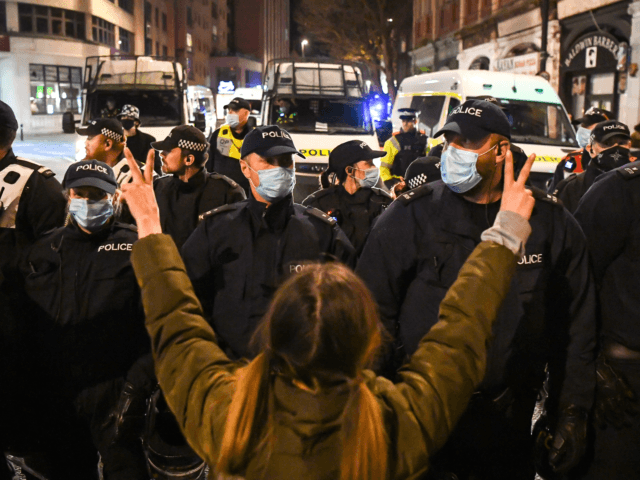Controversial legislation empowering police forces to crackdown on “noisy” protests in Britain is set to become law after passing through the House of Lords on Tuesday evening.
By a margin of 180 to 113, the Police, Crime, Sentencing and Courts Bill was approved by the House of Lords, meaning that it will be sent for Royal Assent to become enacted into law.
The policing bill covers a wide-ranging manner of law enforcement issues, however, a section concerning the policing of protests has garnered widespread criticism, and in some cases violent protests from left-wing radicals.
Under the new law, police in England and Wales will be given authority to clamp down on otherwise peaceful protests if they are deemed too “noisy” and cause “intimidation or harassment” or “alarm or distress” to the public.
The government began crafting the bill in response to disruptive protests from far-left activist organisations such as Black Lives Matter and Extinction Rebellion, which have both cost the taxpayer millions in policing overtime and deployment costs.
Opponents of the legislation have claimed that it will remove the fundamental aspect of protest, namely, to cause disruption in order to have a message noticed by the wider public.
Criticising the legislation, Liberal Democrat Lord Paddick noted that “the more popular the protest, the more likely it is to be noisy and the more likely it is to be banned.”
The House of Lords peer, who previously served as a deputy assistant commissioner in the Metropolitan Police, went on to warn: “Allowing the police to prevent people peacefully meeting together—to ban political rallies, for example—surely puts us on the slippery slope of the erosion of fundamental human rights and the imposition of a police state.”
Amnesty International UK CEO Sacha Deshmukh said: “This is dark day for civil liberties in the UK. This deeply-authoritarian Bill places profound and significant restrictions on the basic right to peacefully protest and will have a severely detrimental impact on the ability of ordinary people to make their concerns heard.
Following the announcement of the proposed curbs on protests in 2021, #KillTheBill protests turned violent. Riots from Antifa radicals in Bristol saw officers attacked and widespread damage to property. At one point, leftist activists even attempted to set up their own ‘CHAZ’-style ‘autonomous zone‘ in the city.
While the bill was ostensibly drafted in order to combat tactics from left-wing radicals, others have warned that it may be used disproportionately against right-wing groups. During the Chinese coronavirus crisis, forces regularly took a “hands off” approach to Black Lives Matter protests — with some officers even prostrating themselves by taking the knee with the group.
Met Commissioner Cressida Dick even admitted that London’s police force took a soft approach to BLM protests over fears of sparking “serious disorder“.
In contrast, anti-lockdown protests were frequently forcefully disrupted by police under the guise of limits set on public gatherings — which were not in fact supposed to cover protests. In a notable instance, police arrested 190 anti-lockdown protesters for attempting to gather in London’s Trafalgar Square on Guy Fawkes Night in 2020.
Then-London Assembly Member David Kurten commented to Breitbart London the following month that there had been a “clear bias” in how Black Lives Matter ralliers were policed compared to anti-lockdown demos.
“You have Black Lives Matter protests with way more than six people that are allowed to go-ahead… but they come in and specifically target people who are just talking because they think we are against the lockdown and we might have opinions that may be unacceptable to those in Westminster,” Kurten said.
Policing tactics in Britain has increasingly become more coordinated and invasive, including the use of drones to monitor protests throughout the country.
Follow Kurt Zindulka on Twitter here @KurtZindulka

COMMENTS
Please let us know if you're having issues with commenting.